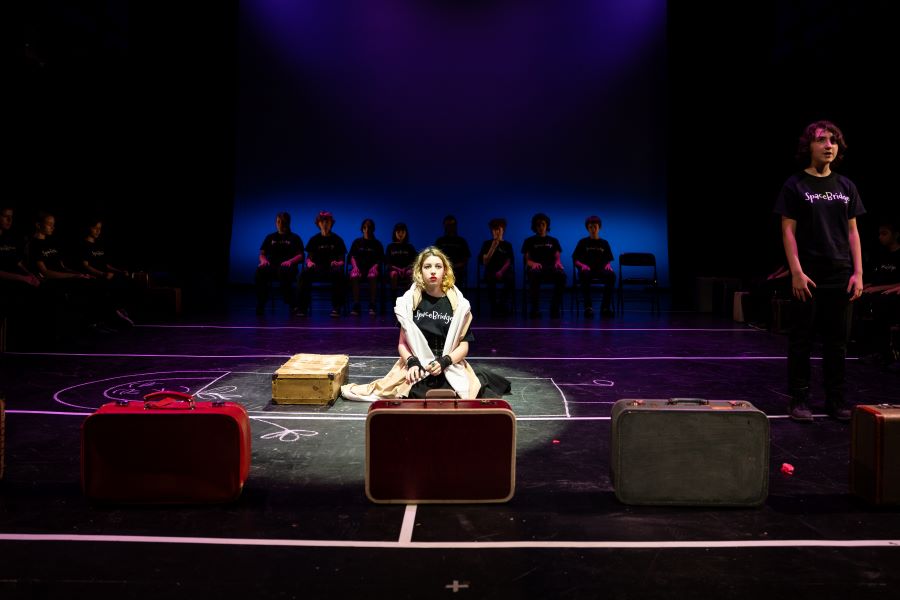In Chapter II, titled “The Departure,” the 11 Russian children enter the theatre’s empty space, each carrying a suitcase. They introduce themselves to the audience with their first names and a word or two about their identity—e.g., “I love pizza,” or, “My idol is Bette Midler.” One by one, they tell the traumatic stories of how they learned they were departing Russia. One says she knew ever since opposition leader Alexei Navalny was poisoned in 2020. Another says she was told two hours before they left in 2022.
Several wonder: “What about my friends? My teachers? What will they say?” One said he wept when he heard they would have to leave “dedushka” and “babushka” (grandmother and grandfather). One asked if he could pack his toy cars and Legos. One was told that the family was leaving on vacation and didn’t learn the truth until they were in the taxi on the way to the airport. In many cases, a child left together with their siblings but only with one parent (typically, the mother).
Collating the details of their individual departures, they created one “composite” child named Masha to tell the story of her arduous journey from Russia to the U.S., which lasted almost two months. Masha packed her stuffed rabbit and said goodbye to her dog (named “Dog”), but compensates for her loss by dreaming that she will meet her idol in America—namely, Sarah Jessica Parker.
She travels with her mother, younger brother, and sister. From the Russian city of Perm, they take an airplane to Yekaterinburg, to Baku in Azerbaijan, then to Mexico City, then to Tijuana. There they discover that their internet connection, which they desperately need for an online lottery to enter the U.S., is not adequate. So they keep moving closer to the U.S. border until their internet connection improves, from Tijuana to Hermosillo and finally to Nogales, where they cross the border into Arizona, then fly to Chicago and finally New York City. There they move from shelter to shelter (Williamsburg, the Bronx), while Masha seizes every opportunity to find a TV, scouring the channels in search of Sarah Jessica Parker.
The Russian children share their feelings and anxieties about being new immigrants. “I worry that I will never finds friends here,” says one. “I’ll be sent back to Russia,” worries another. “I worry that Donald Trump will win.” And so on. At school they have trouble making friends, and suffer from bullying and hate email.
Then the eight American youngsters enter, of roughly the same ages as the Russians. They introduce themselves, explaining that many of them had never spoken to a Russian person before. Subsequently, they share a series of bonding theatre exercises that, as Samantha Smith explains, will help to foster mutual understanding and support. Together, they create a TV series called Far From Home on “NY2 channel.” In the most poignant episode of the series, “If I Were To Return,” the Russian youngsters express their fears to their new American friends about if they were to return to Russia: “I would be bullied at school,” “I would be called a traitor,” “We would be called public enemies,” “My father would be sent to the army, or prison, and I would be put in an orphanage,” “My friends warned me on social media that if I return they would beat me up,” “We would be lined up in front of a firing squad,” etc.
Says one child, “It would be dangerous for my mother—my father was angry that we left and he would snitch on my mother and she would be thrown in prison.”

